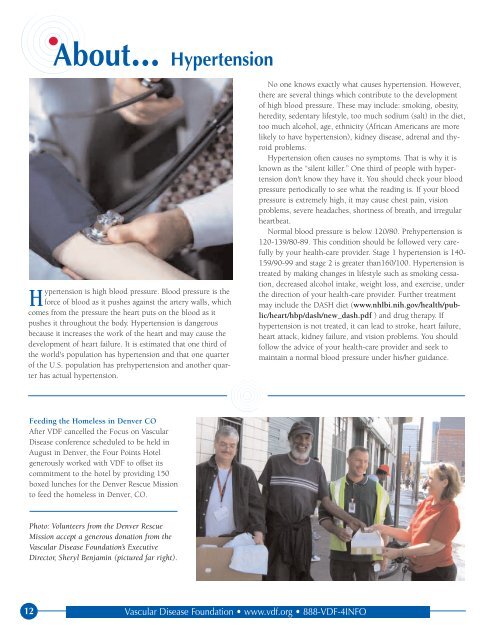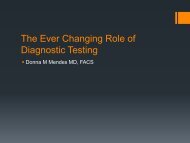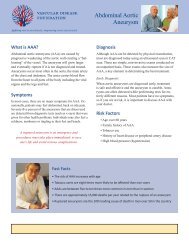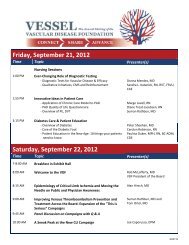V08-N04 - Vascular Disease Foundation
V08-N04 - Vascular Disease Foundation
V08-N04 - Vascular Disease Foundation
Create successful ePaper yourself
Turn your PDF publications into a flip-book with our unique Google optimized e-Paper software.
About... Hypertension<br />
H<br />
ypertension is high blood pressure. Blood pressure is the<br />
force of blood as it pushes against the artery walls, which<br />
comes from the pressure the heart puts on the blood as it<br />
pushes it throughout the body. Hypertension is dangerous<br />
because it increases the work of the heart and may cause the<br />
development of heart failure. It is estimated that one third of<br />
the world's population has hypertension and that one quarter<br />
of the U.S. population has prehypertension and another quarter<br />
has actual hypertension.<br />
No one knows exactly what causes hypertension. However,<br />
there are several things which contribute to the development<br />
of high blood pressure. These may include: smoking, obesity,<br />
heredity, sedentary lifestyle, too much sodium (salt) in the diet,<br />
too much alcohol, age, ethnicity (African Americans are more<br />
likely to have hypertension), kidney disease, adrenal and thyroid<br />
problems.<br />
Hypertension often causes no symptoms. That is why it is<br />
known as the “silent killer.” One third of people with hypertension<br />
don't know they have it. You should check your blood<br />
pressure periodically to see what the reading is. If your blood<br />
pressure is extremely high, it may cause chest pain, vision<br />
problems, severe headaches, shortness of breath, and irregular<br />
heartbeat.<br />
Normal blood pressure is below 120/80. Prehypertension is<br />
120-139/80-89. This condition should be followed very carefully<br />
by your health-care provider. Stage 1 hypertension is 140-<br />
159/90-99 and stage 2 is greater than160/100. Hypertension is<br />
treated by making changes in lifestyle such as smoking cessation,<br />
decreased alcohol intake, weight loss, and exercise, under<br />
the direction of your health-care provider. Further treatment<br />
may include the DASH diet (www.nhlbi.nih.gov/health/public/heart/hbp/dash/new_dash.pdf<br />
) and drug therapy. If<br />
hypertension is not treated, it can lead to stroke, heart failure,<br />
heart attack, kidney failure, and vision problems. You should<br />
follow the advice of your health-care provider and seek to<br />
maintain a normal blood pressure under his/her guidance.<br />
Feeding the Homeless in Denver CO<br />
After VDF cancelled the Focus on <strong>Vascular</strong><br />
<strong>Disease</strong> conference scheduled to be held in<br />
August in Denver, the Four Points Hotel<br />
generously worked with VDF to offset its<br />
commitment to the hotel by providing 150<br />
boxed lunches for the Denver Rescue Mission<br />
to feed the homeless in Denver, CO.<br />
Photo: Volunteers from the Denver Rescue<br />
Mission accept a generous donation from the<br />
<strong>Vascular</strong> <strong>Disease</strong> <strong>Foundation</strong>’s Executive<br />
Director, Sheryl Benjamin (pictured far right).<br />
12<br />
<strong>Vascular</strong> <strong>Disease</strong> <strong>Foundation</strong> • www.vdf.org • 888-VDF-4INFO







